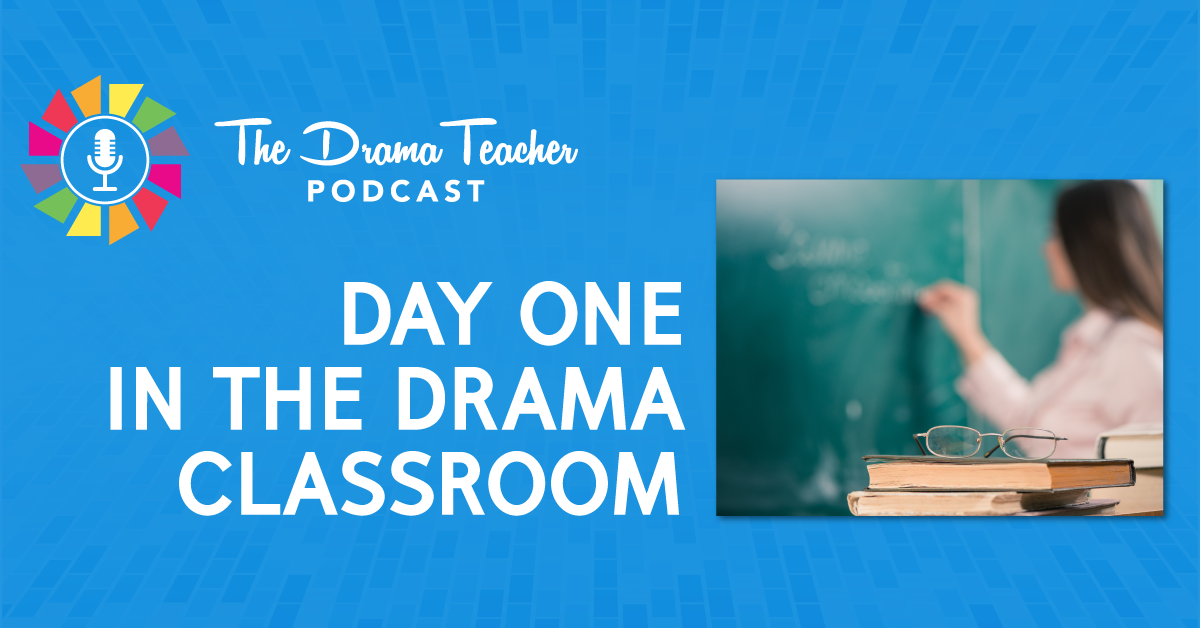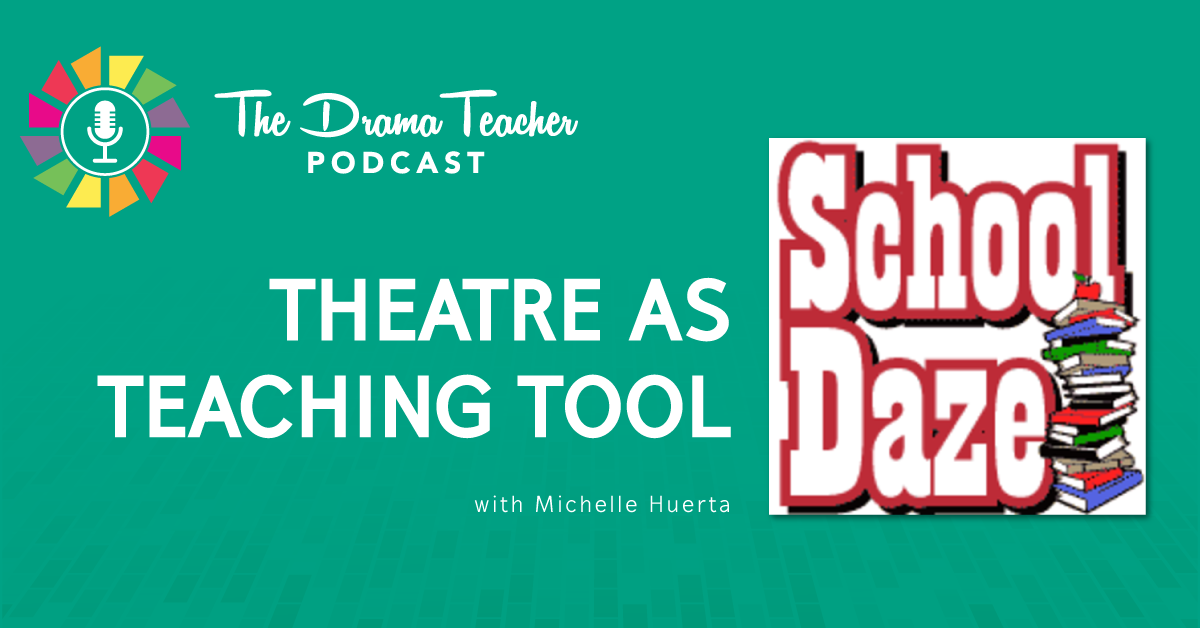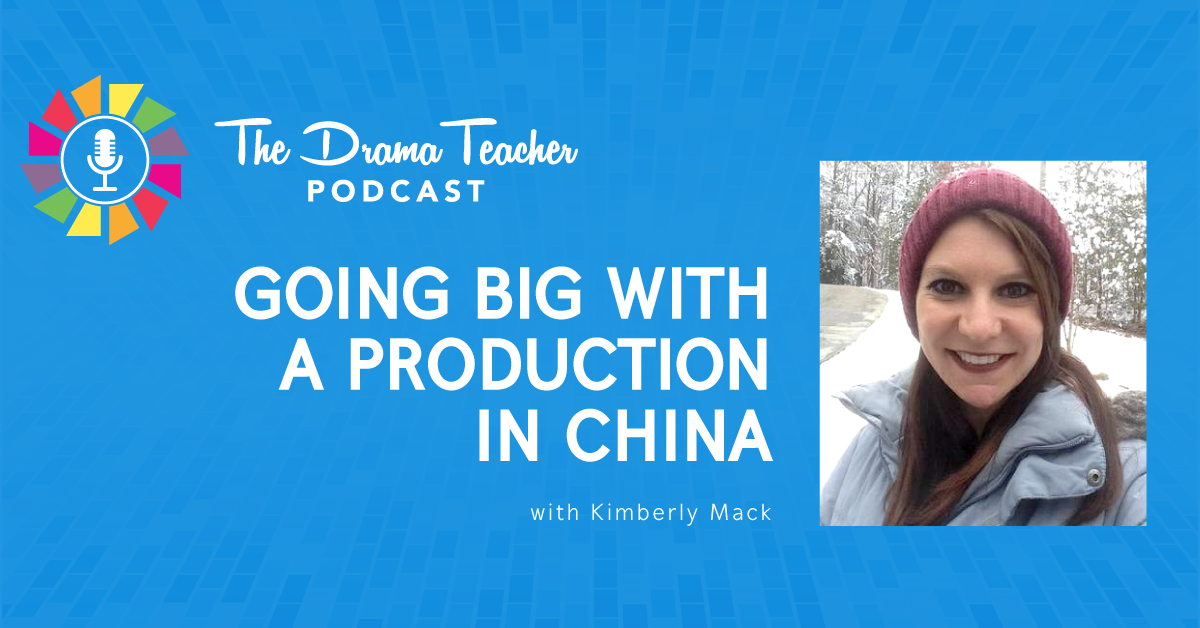Day One of the Drama Classroom
Episode 106: Day One of the drama classroom
For many teachers, the first day of class is the most important day of the whole year. What do you do on “day one?” Listen to five drama teachers talk about what they do with their students to make the most out of that first day.
Show Notes
Episode Transcript
Welcome to TFP – The Theatrefolk Podcast – the place to be for Drama teachers, Drama students, and theatre educators everywhere.
I’m Lindsay Price, resident playwright for Theatrefolk.
Hello, I hope you’re well. Thanks for listening.
Welcome to Episode 106 of TFP. You can find all the links for this episode at theatrefolk.com/episode106.
Now, on the day that this podcast airs, some of you will just be getting in the last throes of summer. Some of you started school two weeks ago which boggles my mind. It has been engrained in me for, I don’t know, almost forty years that school starts the day after Labor Day. School starts the day after Labor Day. You people who start school in August, they’re freaking me out.
And some of you, speaking of which, you’re getting ready to get going right now, and what that means is teachers everywhere across the country, across multiple countries, that first day of school has either just happened or is looming, and for many teachers, the first day of class is the most important day of the year.
What do you do on Day One?
So, let’s find out. We have five teachers who share what they do with their students to make the most out of that first day. Everyone is different; everyone is valuable. Let’s get to it!
Lindsay: Okay! So, now I am talking to Teacher Matt Webster. Hello, Matt!
Matt: Hi there!
Lindsay: And you teach in North Carolina.
Matt: Yes, outside Charlotte, North Carolina.
Lindsay: Awesome. We’re talking about Day One.
How many different classes do you see at the beginning of the year?
Matt: Beginning of the year, I have a lighter load because I’m the department chair for fine arts so I teach typically two classes a day and people are going to pull their hair and roll their eyes at that, but I teach two classes a day and, usually, I have four classes overall that I teach and two of them are often beginning theatre classes. That’s not true; I teach eight classes because we do A Day, B Day. So, I have more classes.
Lindsay: All right, Matt. You teach a lot of classes, right?
Matt: Yes, I have less than most, but it’s all good.
Lindsay: So, let’s talk about those beginning theatre classes. So, you’re walking into this class for the first time, it’s Day One, it’s your beginning students, what’s the first thing you do?
Matt: First thing I do is hand out my syllabus because the syllabus is the contract between the teacher and the students, and it lays out the expectations for everyone. It also gives the rules of the classroom, it lays out the curriculum that we’re going to follow, and basically tells the students what I expect from them, what this class is going to look like, and what I’m looking for out of them as students as the teacher.
Lindsay: Okay. So, you think it’s more important to do that kind of legwork first as opposed to, “Hey, let’s play a game! Hey, let’s do that!” Why do you choose to do it that way?
Matt: There’s always time to play games and setting that tone, Day One, is going to set the tone for the rest of the semester or the rest of the year, and it might not take the whole time to go over all of that material and we’ll still have time to maybe play a game. But, when you start off playing a game, what you’re telling the students is “this class is playtime” and that’s what they’ll take away from it. And, if you want your class to be more than playtime, then you need to set that expectation.
Lindsay: Awesome. Thank you very much!
Now I am talking to Jessica Stafford. Hello, Jessica!
Jessica: Hi, Lindsay! How are you?
Lindsay: I’m all right. Okay. So, Jessica is a middle school teacher in Owensboro, Kentucky. How long have you been there?
Jessica: I’m going into my fourth year at Owensboro.
Lindsay: Ah, awesome. So, what do you like to do – and I like this, we’re going to get something with middle school – so, what do you like to do on Day One at the middle school level?
Jessica: Day One, I make sure I’m at the door, I’m smiling, I’m saying hello, I’m welcoming them in, and then it’s very much my expectations. We go over rules, expectations. We talk about how we’re good audience and how we support each other and how this is supposed to be a very safe environment and, because what we do is so personal, I want to make sure they understand that that’s the number one priority.
Lindsay: Oh, I like that. I like that, too, that it’s a welcome. It’s like, “Hey, welcome into my world,” essentially.
Jessica: Yes.
Lindsay: And that it’s a safe spot.
Jessica: Absolutely. Because, otherwise, the kids aren’t going to work for you. You know, middle school kids, they already have so much that they are struggling with anyway – just with identity and hormones and all that fun stuff – so, to make sure they come in and they know that they’re wanted and they’re welcome there, and that I have, you know, expectations and they’re set pretty high, it kind of lets them know where they’re starting.
Lindsay: I love that. I think that’s great. Thank you so much, Jessica!
Jessica: Absolutely!
Lindsay: So, now I’m talking to Brian Borowka. Hello, Brian.
Brian: Hi!
Lindsay: Now, you’re in a bit of a different experience with your school in particular for Day One because you basically know your students, right? Because you have elementary to grade twelve all in one school.
Brian: Right. So, I’ve worked with most of these kids already before this class when they were younger.
Lindsay: Yeah, and they all know each other so you don’t really need the setting up of things. You don’t really need the icebreaker games. But you do teach a musical theatre class for grade eights.
Brian: Right.
Lindsay: So, what’s something you would do on the first day of a class like that?
Brian: Right. So, we kind of like to set the foundation for the class itself by talking about musicals. So, we’ll sit everybody out and we’ll kind of have them share, like, what shows have they seen, what musicals have they liked, and just kind of get that conversation going – why do they like a particular musical, what is it about musical theatre that appeals to them, what shows really knocked them out and for what reasons – and then that kind of sparks that conversation that gets us talking about why we do musical theatre and why we love it.
Lindsay: Also, it must get you to know where their level is about which students have a lot of musical theatre knowledge and maybe which ones don’t.
Brian: Yeah, exactly right, and you definitely have that variety which is interesting. You have some kids who have seen – I mean, we’re so close to New York so you have kids who have seen a lot of Broadway shows and talk about everything that came out, and you have some kids who have never seen a Broadway show. So, to kind of get that conversation going and kids will all of a sudden get interested because one kid will say, “Oh, I saw this show and that show,” and it’ll be, “Oh, I’d love to see that,” and so it kind of gets the kids talking about musical theatre in a way that they would not have otherwise.
Lindsay: Do you think that this kind of conversation – like, when you figure out who knows what and maybe how many of your students aren’t as familiar – do you adapt maybe exercises later down the road depending on what you’re learning in this first day?
Brian: Yeah, definitely! I mean, because, a lot of times, I can empower some of the kids who are sort of musical theatre experts to take the lead in some activities and so they’ll have things that they know from shows that they’ve seen. Like, “Oh, it would be really fun to do this kind of warm-up.” A lot of these kids have already been to camps and they have some theatre background. So, I feel like kind of getting them to buy into being sort of a helper in the class can go a long way.
Lindsay: Awesome. Thank you so much, Brian!
Brian: Sure!
Lindsay: Now I’m going to talk to Christian Kiley. Hello, Christian!
Christian: Hi, Lindsay!
Lindsay: Okay. So, we’re talking Day One with your students. What’s something that you do on Day One?
Christian: I’m going to start this year – as I have other years in the past – with an exercise I call “prop magic” which is I take a bunch of just random props and I put them in a line downstage and the actors get up and they introduce themselves and then just, when they feel like it, they go down and they interact with one of the props briefly, they set it back down, and they go back to the upstage neutral line which would be when they’re out of character and then, of course, when they move downstage and they’re interacting with the prop, they’re in character. So, you can stop the exercise and teach a lot of principles about stage geography, about staying in character, about fourth wall, and all those other things while it’s going on.
I make it mandatory that every student get up at least once and try it.
Now, the deal is you don’t have to speak. So, if it’s an umbrella and I just want to get up and pretend it’s a cane and take a couple of steps with it and then put it back, that’s all I have to do, and that’s a victory for that student. They get to go home and say, “You know what? I participated today.”
Lindsay: You know, sometimes, it takes baby steps, doesn’t it? You know, you do, like, “Okay. You’re going to take one step today.” There’s a whole semester, isn’t there? You don’t need to do the whole thing.
Christian: Well, in the last couple of years, I’ve been able to say this. If you could have full participation on that first day, you’ve won a lot of skeptics over to your side.
Lindsay: Because there must be students in your class who are just dead set against being there in the first place.
Christian: Yeah, it’s the “too cool for school” crowd that tends to be the group that butts heads with me a little bit because, really, what you’re saying is you’re too cool for life and, really, what you’re saying is you’re too cool for yourself. So, I always turn it back and kind of hold the mirror up and say, “Hey, you don’t want to be here, it’s you though, isn’t it? Because you like yourself. So, be with yourself for a week. Give this class a chance,” and then I make them have an exit interview with me. So, if they want to leave, they have to talk to me first before they talk to their counselor.
And then, see, it’s a win-win situation because, if they articulate their argument very well, I say, “That’s all good acting is, why don’t you just stay in the class?”
Lindsay: Oh, I like that! A little reverse psychology there!
Awesome. Thank you very much, Christian!
Christian: All right. Thank you.
Lindsay: Okay. Now I’m talking to Jeff Pinsky. He is the only drama teacher in his school and, Jeff, what do you do on Day One?
Jeff: On Day One, I like to throw them right into the deep end – sink or swim! No, it’s about drama, as you know, and theatre production, it’s all about teamwork.
Lindsay: Ah, for sure!
Jeff: If one cog in the machine doesn’t work, then the whole thing falls apart. So, I throw them the team games and, at the same time, they’re getting to know each other. We do some spatial exploration stuff, we do some trust exercises, we do some grouping and communication games – even something as simple as a game like “ten- or twenty-second letters” where I stand as high as I possibly can on a ledge or something within my classroom and I say, “All right. As an entire group, or groups of five or six or ten or whatever, I want you to arrange yourselves and make yourselves look like the capital letter B. Go!”
Lindsay: Ah!
Jeff: And they do it on the ground. And they just do it with their body – standing, sitting, holding hands, whatever it might be. And then, as the game progresses and they start getting the hang of it, then we take away the element of communication. So, we say, “Okay. Now we have ten seconds and you’re not allowed to talk. So, how do you still get this thing done with non-verbal cues?” It’s a quick and easy one to learn each other’s names along the way.
Lindsay: Yeah, and what a great introduction to that whole thing of ensemble building and communication.
Jeff: And I do that game of the first day with every one of my grades – from my brand new kids on the first day of high school, all the way to my grads who have been with me for three or four or five years at that point.
Lindsay: Hey. So, if they know this game is coming, are they like experts at their non-verbal communication?
Jeff: Not really.
Lindsay: Not really?
Jeff: Well, because after summer of living, of developing their thumb strength with texting, it’s kind of getting used to, you now, talking to people face-to-face all over again. And, at the same time, on the first day of school, they just want to catch up and talk about summers. I’m like, “No, we’re starting school. It’s time to get down to business.”
Lindsay: Ah, that’s important, too. It’s like, “Look, this is class, just like every other class,” right?
Jeff: Absolutely. It makes me both feared and loved.
Lindsay: Awesome. Thank you so much!
Thank you so much, Matt, Jessica, Brian, Christian, and Jeff!
And, again, you can catch any links at theatrefolk.com/episode106.
Before we go, let’s do some THEATRFOLK NEWS.
So, the doors are closing very soon on the Drama Teacher Academy, August 22nd to be exact. They won’t be closing forever – just for right now. Because this is a new project, not only for every member but also for us, there have been a ton of questions and we want to make sure every question is answered, everyone is happy, and that no one gets lost in the halls.
So, if you have a question, go over to the show notes, that’s at theatrefolk.com/episode106, and there’s a link to a questions post where we address a number of things. I think we get every question answered, but I’d love to hear it if there’s one that we haven’t got to.
And, if you’re thinking, “Drama teacher what?” Go, again, to the show notes – theatrefolk.com/episode106 – and click the other link for the Drama Teacher Academy and you’ll find out all the info right there and do it quick! Door is closing, August 22nd – not forever, but just for right now.
Finally, where, oh, where can you get this wonderful podcast? Well, we post new episodes every Wednesday at theatrefolk.com and on our Facebook page and Twitter. You can find us on YouTube.com/Theatrefolk. You can find us on the Stitcher app and you can subscribe to TFP on iTunes. All you have to do is search for the word “Theatrefolk.”
And that’s where we’re going to end. Take care, my friends. Take care.
Music credit:”Ave” by Alex (feat. Morusque) is licensed under a Creative Commons license.



